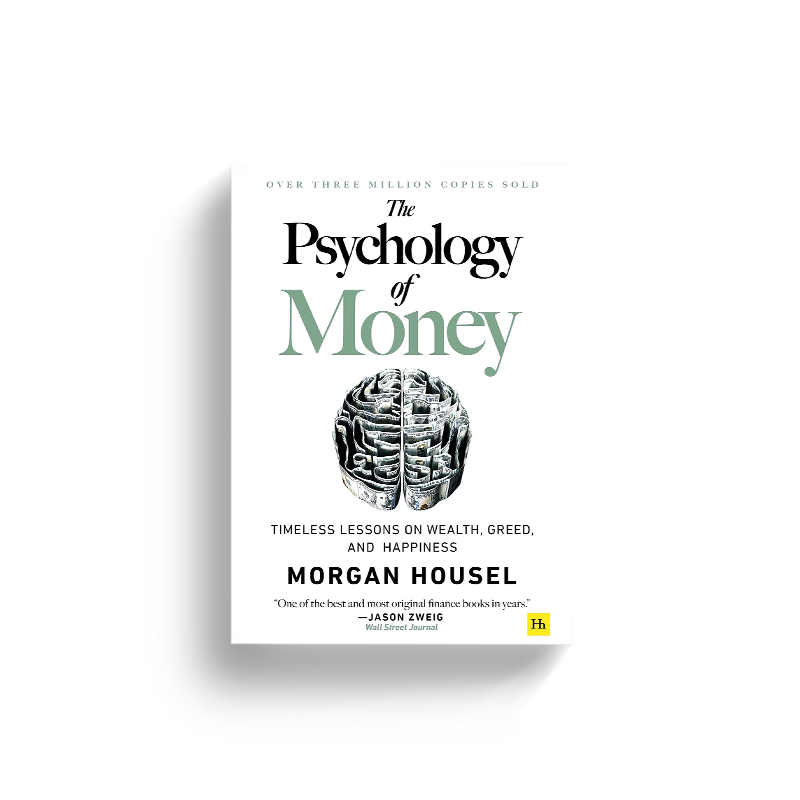The Psychology of Money by Morgan Housel (Book Review)
The Psychology of Money by Morgan Housel explores people’s complex relationship with money. Rather than focusing solely on technical aspects of finance, Housel dives into the behavioral and psychological factors influencing how we think about and manage money. Through stories, he illustrates how emotions, personal experiences, and social pressures shape our financial decisions, often more than knowledge or mathematical equations do. For entrepreneurs and anyone interested in understanding the human side of finance, The Psychology of Money offers a refreshing perspective. Housel challenges traditional knowledge by highlighting the importance of emotional intelligence over sheer intellect when it comes to financial success, making this book a must-read for anyone looking to rethink their approach to money.
Who is Morgan Housel?
Morgan Housel is a partner at The Collaborative Fund and a New York Times bestselling author. He is known for his insightful books The Psychology of Money and Same As Ever, which have sold over six million copies and been translated into more than 50 languages.
Morgan is a two-time winner of the Best in Business Award from the Society of American Business Editors and Writers and has received the prestigious New York Times Sidney Award. Recognized for his influence in the financial world, MarketWatch named him one of the 50 most influential people in markets. He also serves on the board of directors at Markel.
Why Should You Dive Into “The Psychology of Money”?
The Psychology of Money by Morgan Housel is a great resource that goes beyond traditional financial wisdom. The book shifts the focus from the numbers-driven approach of money management to the psychological and behavioral aspects of financial decision-making. Housel asserts that doing well with money isn’t necessarily about what you know but how you behave. This perspective is particularly relevant for business people, where decisions often hinge on more than just the bottom line.
Housel’s central thesis is that financial success is less about IQ and more about EQ—emotional intelligence. This is a refreshing take for business owners who often find themselves in situations where their decisions are driven by emotions, personal biases, and experiences rather than just data. The book emphasizes that money management isn’t just a math-based field; it’s human-based, influenced by history, ego, pride, and societal pressures. For entrepreneurs, this means acknowledging that their financial behaviors—how they react to market changes, investment opportunities, or even daily business expenses—can significantly impact their success.
One of the most compelling aspects of The Psychology of Money is its use of storytelling. Housel presents 19 short stories exploring how people think about money. For business owners, these narratives provide a mirror to reflect on their money habits and behaviors. It’s about understanding the concept of enough, the dangers of over-optimism, and the role of luck and risk. Each story offers a lesson that can be directly applied to managing a business.
Unlike many financial books filled with complex formulas and technical jargon, Housel’s writing is accessible and relatable. He breaks down complex ideas into simple concepts that anyone can understand. This is valuable for business owners who may not have a formal background in finance but need to make critical financial decisions daily. Housel’s insights into how personal history and unique worldviews influence financial decisions can help entrepreneurs better navigate their own financial landscapes, from investing in their businesses to managing personal wealth.
For entrepreneurs, The Psychology of Money reminds them that managing money isn’t just about spreadsheets and forecasts. It’s about understanding human behavior and making decisions that align with one’s values and long-term goals. Housel’s book is not just about becoming financially savvy but also about becoming more self-aware, making it a must-read for anyone looking to build a sustainable and successful business.
The Psychology of Money by Morgan Housel offers a fresh perspective on money management, focusing on the overlooked psychological aspects. With its engaging stories, this book is a great addition to any entrepreneur’s reading list, helping them make better financial decisions for their businesses and their lives.
Final Thoughts
The Psychology of Money by Morgan Housel explores the psychological and emotional factors that drive our financial decisions. For entrepreneurs, the book is a powerful tool for understanding that financial success goes beyond numbers and data—it’s about human behavior, emotions, and the unique experiences that shape our decisions. Housel’s accessible writing style and compelling stories make complex financial concepts easy to understand and apply in real-life situations.
By shifting the focus from technical know-how to emotional intelligence, Housel provides invaluable insights into managing money in a way that aligns with one’s values and long-term goals. This book encourages entrepreneurs to become more self-aware and mindful of their financial behaviors, ultimately helping them build sustainable and successful businesses. In a world where traditional financial advice often falls short, The Psychology of Money stands for anyone looking to make more informed financial decisions.

